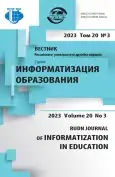Удовлетворенность качеством дистанционного образования в медицинском вузе в период карантинных мероприятий
- Авторы: Букатаева А.Б.1,2, Овчаров А.В.1
-
Учреждения:
- Алтайский государственный педагогический университет
- Медицинский университет Семей
- Выпуск: Том 20, № 3 (2023)
- Страницы: 328-336
- Раздел: ДИСТАНЦИОННОЕ, СМЕШАННОЕ И ПЕРЕВЁРНУТОЕ ОБУЧЕНИЕ
- URL: https://journal-vniispk.ru/2312-8631/article/view/321268
- DOI: https://doi.org/10.22363/2312-8631-2023-20-3-328-336
- EDN: https://elibrary.ru/QBCDCA
- ID: 321268
Цитировать
Полный текст
Аннотация
Постановка проблемы. В течение пандемии COVID-19 базисное медицинское образование, традиционно имевшее строго очный характер, на протяжении полного учебного года было дистанционным. Это потребовало значительных изменений в структуре подходов к обучению, которые привели к определенным особенностям в его качестве и личностном восприятии субъектами образовательного процесса. Цель исследования - разработка подхода к совершенствованию дистанционного медицинского образования на основании данных об удовлетворенности субъектов учебного процесса. Методология. Изучены данные Медицинского университета Семей (МУС) и Университета имени Шакарима г. Семей (УШ). В качестве респондентов выступили 450 студентов 4-6 курсов МУС и 385 студентов 4-5 курсов УШ. Осуществлено анкетирование 98 членов профессорско-преподавательского состава (ППС) МУС и 105 - УШ, участвовавших в дистанционных программах обучения в 2020-2021 учебном году. Результаты. Студенты МУС отметили недостаточную активность ППС, недостатки существующего методического обеспечения, проблемы связи со стороны обучающегося. В УШ ключевыми проблемами оказались недостатки связи и оборудования, недостаточная активность и готовность ППС. По мнению преподавателей обоих вузов наблюдалась недостаточная активность обучающихся. Также отмечена недобросовестность студентов. Более значимой в медицинском вузе оказалась недостаточная подготовка преподавателей к осуществлению дистанционного обучения. Заключение. Удовлетворенность студентов и преподавателей дистанционным обучением в период COVID-19 оставалась высокой, но имела проблемы, связанные как с материальными, так и человеческими ресурсами.
Ключевые слова
Об авторах
Алмагуль Бекеновна Букатаева
Алтайский государственный педагогический университет; Медицинский университет Семей
Автор, ответственный за переписку.
Email: alma_bukataeva@mail.ru
ORCID iD: 0000-0003-3154-6703
аспирант, Алтайский государственный педагогический университет; преподаватель, кафедра IT в медицине НАО, Медицинский университет Семей
Российская Федерация, 656031, Барнаул, ул. Молодежная, д. 55; Республика Казахстан, 071400, Семей, ул. Абая, д. 103Александр Владимирович Овчаров
Алтайский государственный педагогический университет
Email: ovcharov2010@yandex.ru
кандидат физико-математических наук, доктор педагогических наук, профессор, заведующий кафедрой технологических дисциплин Российская Федерация, Барнаул, ул. Молодежная, д. 55
Список литературы
- Filippova IYa, Koktsinskaya EM. Review of modern methods of distance education. Video Science. 2016;(1):13-18. (In Russ.)
- Keleş M.K., Özel S.A. A review of distance learning and learning management systems. In Cvetkovic D. (ed.) Virtual Learning. InTech; 2016. http://doi.org/10.5772/65222
- Kasyanenko EF, Rubtsova LN, Dimov ID, Bogomolova VYu. Distance and mobile education in medical universities: problems and prospects. (In Russ.) Available from: https://s.science-education.ru/pdf/2019/5/29216.pdf
- Agranovich ML, Ermachkova YuV, Seliverstova IV. Russian education in the context of international indicators, 2019. Analytical report. Moscow: Center for Education Statistics and Monitoring FIDE RANEPA; 2019. (In Russ.)
- Danicae M.K. Modernization of distance learning as a necessary component of the education system. International Journal of Information and Communication Technologies. 2020;1(4):92-98. (In Russ.)
- Wijesooriya NR, Mishra V, Brand PL, Rubin BK. COVID-19 and telehealth, education, and research adaptations. Paediatric Respiratory Reviews. 2020;35:38-42. http://doi.org/10.1016/j.prrv.2020.06.009.
- Ahmed H, Allaf M, Elghazaly H. COVID-19 and medical education. Lancet Infectious Diseases. 2020;20(7):777-778. https://doi.org/10.1016/S1473-3099(20)30226-7
- Evans AZ, Adhaduk M, Jabri AR, Ashwath ML. Is virtual learning here to stay? A multispecialty survey of residents, fellows, and faculty. Current Problems of Car- diology. 2023;48(6):101641. https://doi.org/10.1016/j.cpcardiol.2023.101641
- Glantz S. Medico-biological statistics. Moscow: Praktika Publ.; 1998.
- Babacan S, Dogru Yuvarlakbas S. Digitalization in education during the COVID-19 pandemic: emergency distance anatomy education. Surgical Radiologic Anatomy. 2022;44(1):55-60. https://doi.org/10.1007/s00276-021-02827-1
- Li J, Yang S, Chen C, Li H. The impacts of COVID-19 on distance education with the application of traditional and digital appliances: evidence from 60 developing countries. International Journal of Environment Research in Public Health. 2022;19(11):6384. https://10.3390/ijerph19116384
- Muller O.Yu. Education in the context of digitalization. Humanitarian and Pedagogical Research. 2021;5(2):6-8. https://doi.org/10.18503/2658-3186-2021-5-2-6-9
- Camargo CP, Tempski PZ, Busnardo FF, Martins MA, Gemperli R. Online learning and COVID-19: a meta-synthesis analysis. Clinics (Sao Paulo). 2020;75:e2286. http://10.6061/clinics/2020/e2286
- Kaul V, Gallo de Moraes A, Khateeb D, Greenstein Y, Winter G, Chae J, Stewart NH, Qadir N, Dangayach NS. Medical education during the COVID-19 pandemic. CHEST. 2021;159(5):1949-1960. https://doi.org/10.1016/j.chest.2020.12.026
- Attia M, Antit S, Affes M, Zairi S, Baccouche I, Neji H, Hantous-Zannad S. Distance education in times of COVID-19: a leap into the future? Tunis Medicine. 2021;99(5):511-517.
- Hilburg R, Patel N, Ambruso S, Biewald MA, Farouk SS. Medical education during the coronavirus disease-2019 pandemic: learning from a distance. Advanched Chronic Kidney Diseases. 2020;27(5):412-417 https://doi.org/10.1053/j.ackd.2020.05.017
- Murthy N, Saelee R, Patel Murthy B, Meng L, Shaw L, Gibbs-Scharf L, Harris L, Chorba T, Zell E. COVID-19 vaccine initiation and dose completion during the SARS-CoV-2 Delta variant surge in the United States, December 2020 - October 2021. Public Health Report. 2023;138(1):183-189. http://doi.org/10.1177/00333549221123584
Дополнительные файлы









